
The Willmar Ministry was in office in Luxembourg from 2 December 1848 to 23 September 1853.

The Willmar Ministry was in office in Luxembourg from 2 December 1848 to 23 September 1853.
The Constitution that resulted from the Revolution of 1848 came into force on 1 August 1848. [1] On 28 September the first elections to the Chamber of Deputies took place. [1]
From the first meeting of the parliament, the Fontaine government faced opposition from the liberals who described him as a "turncoat". [1] When Gaspard-Théodore-Ignace de la Fontaine received only a feeble majority in a confidence vote in the Chamber, he decided to resign. [1] Jean-Jacques Madelaine Willmar, the son of the former governor of Luxembourg in the time of the United Kingdom of the Netherlands, was asked to form a new government. [1] Apart from the conservatives Mathias Ulrich and Jean Ulveling, the new prime minister appealed to Norbert Metz, the leader of the radical liberals, who was given the ministries of Finances and the Armed Forces. [1]
Norbert Metz, who was pro-Belgian and hostile to the German Confederation, made his mark on the Willmar government's foreign policy. [2] The turf war between the Administrator General for Finances and the director of German customs in Luxembourg irritated the Prussian authorities to the extent that they threatened to not renew the customs union agreement, which was due to expire in 1854. [2] Moreover, the government shied away from the demands of the German Confederation by refusing to send a Luxembourgish contingent against Schleswig, and compromised relations with its partner in personal union by dragging out the negotiations on Luxembourgish participation in the reimbursement of the debt of the Kingdom of the Netherlands. [2]
After the death of William II on 17 March 1849, relations between the government and the Crown deteriorated. [2] An authoritarian person, William III wished to return to the autocratic regime of before 1848 and soon clashed with Willmar's coalition government. [2] On 5 February 1850, he named his brother, Prince Henry, Lieutenant-Governor of the Grand Duchy. [2] [3] Whether he liked it or not, Prince Henri was forced to apply the reactionary policy of William III. [2]
The Willmar government took important measures with regards to currency. The law of 20 December 1848 imposed the franc as the accounting unit of public administration. [3] The budget and public documents were henceforth denominated in francs and centimes, not in florins. [3] However, without a real Luxembourgish currency, people continued to use foreign coins, usually thalers. [3] In 1851, the government launched a crucial debate in the Chamber on the question of producing a national currency. [3] On 9 January 1852 a law was promulgated which ordered the production of copper money for the Grand Duchy. [3] The first Luxembourgish currency was put in circulation in 1854. [3]

Jean-Jacques Madeleine Willmar was a Luxembourgish politician and jurist. An Orangist, he was the second prime minister of Luxembourg, serving for five years, from 6 December 1848 until 23 September 1853.
Charles-Mathias Simons was a Luxembourgish politician and jurist. He was the third prime minister of Luxembourg, serving for seven years, from 1853 until 1860.

The first Juncker–Asselborn Government was the government of Luxembourg between 31 July 2004 and 23 July 2009. It was led by, and named after, Prime Minister Jean-Claude Juncker and Deputy Prime Minister Jean Asselborn.
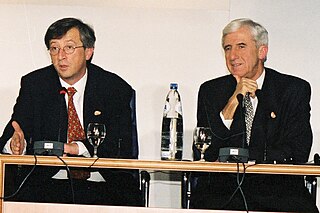
The Juncker–Poos Government was the government of Luxembourg between 26 January 1995 and 7 August 1999. It was led by, and named after, Prime Minister Jean-Claude Juncker and Deputy Prime Minister Jacques Poos.
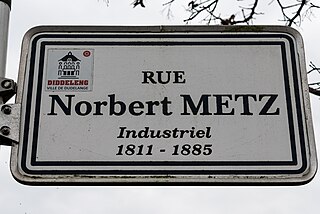
Jean-Joseph Norbert Metz was a Luxembourgish politician and engineer. With his two brothers, members of the powerful Metz family, Charles and Auguste, Metz defined political and economic life in Luxembourg in the mid-nineteenth century.

The Santer-Poos II Government was the government of Luxembourg between 14 July 1989 and 13 July 1994. It was the second of three led by, and named after, Prime Minister Jacques Santer. Throughout the ministry, the Deputy Prime Minister was Jacques Poos.
The Constituent Assembly of Luxembourg was a constituent assembly called in 1848 in Luxembourg to write and pass a new national constitution.

The Werner-Cravatte Government was the government of Luxembourg between 15 July 1964 and 6 February 1969. Throughout its term, the Deputy Prime Minister was Henry Cravatte, replacing Eugène Schaus, who had been Deputy Prime Minister in the first Werner-Schaus Government. It was a coalition between the Christian Social People's Party (CSV), and the Luxembourg Socialist Workers' Party (LSAP).

Jean Ulveling was a Luxembourgian statesman, politician, and historian. He served as a member of the Council of State of Luxembourg for some years, and was a member of the Constituent Assembly which framed a new constitution in 1848. From 1854 to 1856 he represented the canton of Wiltz in the Chamber of Deputies.

The Tornaco Ministry was in office in Luxembourg from 26 September 1860 until 3 December 1867. It was reshuffled six times.

The Blochausen Ministry was the government of the Grand Duchy of Luxembourg from 26 December 1874 to 20 February 1885. It was led by Baron Félix de Blochausen.
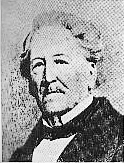
The Fontaine Ministry formed the government of Luxembourg from 1 August 1848 to 2 December 1848. It was headed by Gaspard-Théodore-Ignace de la Fontaine.
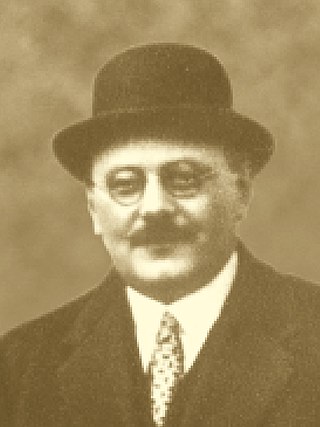
The Prüm Ministry took office in Luxembourg on 20 March 1925. It was formed after the Chamber elections of 1 March 1925 and was supported by the Independent National Party, the Liberals, the Socialists and elements of the Party of the Right. It resigned on 16 July 1926, as the Liberals and Socialists could not agree over a bill for workers' holiday.
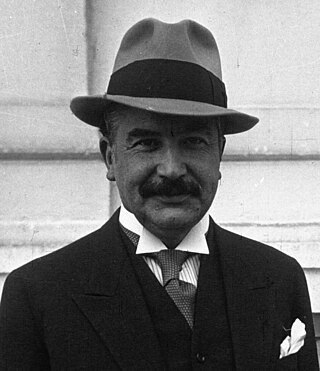
The Bech Ministry was the government of Luxembourg that came into office in Luxembourg on 16 July 1926 after the resignation of the Prüm Ministry, and was headed by Joseph Bech. It was reshuffled on 11 April 1932 and on 27 December 1936. It stepped down after the referendum on the so-called Maulkuerfgesetz, in which the majority of voters decided against the law.

The Reuter Ministry was the government in office in Luxembourg from 28 September 1918 until 20 March 1925, headed by Émile Reuter. It resulted from the Chamber elections of 28 July and 4 August 1918 and was reshuffled on 5 January 1920 as a result of the elections of 26 October 1919. There was a further reshuffle on 15 April 1921, when the Liberals left the government.

The Servais Ministry was in office in Luxembourg from 3 December 1867 to 26 December 1874. It was reshuffled four times.
The Simons Ministry was in office in Luxembourg from 23 September 1853 to 26 September 1860. Initially it just consisted of three members of the government, to which two more were added on 23 September 1854.

The Eyschen Ministry was in office in Luxembourg for 27 years, from 22 September 1888 to 12 October 1915. It was headed by Paul Eyschen, and ended with his death.
The Revolution of 1848 in Luxembourg was part of the revolutionary wave which occurred across Europe in 1848. The Grand-Duchy of Luxembourg at that time was in personal union with the Kingdom of the Netherlands.